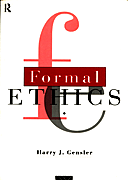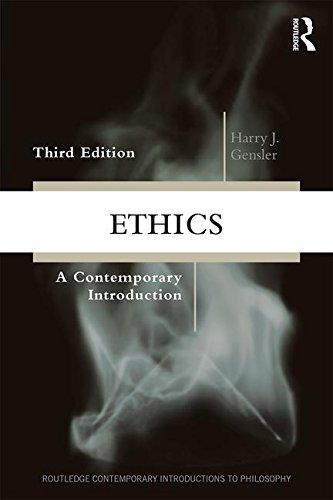This third edition of
Ethics: A Contemporary Introduction, while building on the strengths of earlier editions, has some major improvements.
The basic plan is the same, but enhanced. Get students to struggle with the big questions about morality. Start with a dreadful view that so many of them like - that good is relative to culture, that "good" means "socially approved." Use a fictional Ima Relativist student to present the view convincingly; then demolish the view. Push students to think critically instead of just accepting what sounds good. Get them to ask how, in such a diverse world, we can think out moral issues together in the wisest and most rational way. Study views that base ethics on feelings, God's will, or reason; focus on good points and flaws in the views. Then move toward a sophisticated version of earth's most global general moral perspective - the golden rule, "Treat other as you want to be treated." Emphasize the importance of knowing how your action affects others, imagining yourself on the receiving end of the action, and treating others only as you're willing to be treated in the same situation. Apply this to areas like racism and sexism, global warming, teaching morality to children, animal treatment, immigration, and professional ethics. Explore how the golden rule is global and connects to world religions and evolution. Then investigate utilitarianism and nonconsequentialism, and issues about virtue and justice. To wrap up, apply the various views in the book to the hotly disputed topic of abortion. Along the way, be clear, concise, and direct - and provide great examples, class slides, and computer instructional software.
I'm happy with how earlier editions were received. I've got much positive feedback from teachers, students, and general readers. And I'm gratified that the book was translated into French, Chinese, Thai, and Persian.
I've taught this book and the intro ethics course regularly the last few years. And I've written two further books on related topics: Ethics and the Golden Rule (Routledge 2013) and Ethics and Religion (Cambridge 2016). Both experiences gave me ideas on how to improve this book.
This third edition is better organized and flows more smoothly. Its division into four main parts is now clearer. I reorganized the golden-rule part into chapters on GR logic, GR applications, and GR frameworks. I cut out the separate chapters on virtue and on natural law, which interrupted the flow of ideas, and put these themes into other chapters in a more integrated way.
This third edition adds optional sections on advanced topics; teachers can choose to cover these in class, ignore them (the book makes sense without them), or just encourage interested students to read them. These sections extend the range of the book, now making it suitable for introductory to intermediate ethics courses. To see what these optional sections are about, look for "(optional)" in the Contents; the first six deal with Kohlberg's moral psychology, whether morality is gendered, types of relativism, early Greek ethics, Hume, and the prisoner's dilemma.
There are lots of other improvements. These include clearer explanations, better examples, names for key arguments, a better Kindle version, and a greater emphasis on consistency, global warming, multiculturalism, ethical universals, evolution and biology, and groupism.
I improved the companion EthiCola software, which runs on Windows, Macintosh, and Linux. I adapted the program to Windows touchscreens and tablets, I made it easier to set up on a Macintosh, and I brought the chapter exercises up to date. EthiCola (with a score-processing program, teacher manual, and class slides) can be downloaded for free from either of these Web addresses (harrycola.com and harryhiker.com are clones of each other - so if one fails then try the other): http://www.harryhiker.com/ec or http://www.harrycola.com/ec. The teacher manual and class slides are conveniently accessible from EthiCola's HELP menu; so I suggest that you just install EthiCola (teachers should check the option to install the score processor too).
I wish to thank all who have somehow contributed to this third edition. I thank Andy Beck at Routledge and his staff and reviewers, who made good suggestions. I thank my ethics students, especially those whose puzzled looks pushed me to make things clearer. And I thank the many teachers, students, and self-learners who have e-mailed me over the years.
I hope you enjoy the book. I hope it deepens your appreciation of the golden rule. And I hope it helps you think more clearly about one of life's central questions: "How can we form our moral beliefs in the wisest and most rational way?"
Harry J. Gensler
Philosophy Department
Loyola University
Chicago, IL 60660 USA
Some quotes from reviewers
"No one weds philosophical rigor to undergraduate pedagogy like Gensler. His comprehensive explanations remain exceptionally accessible for any reader, while the addition of optional sections on advanced topics and greater emphasis on issues like global warming and multiculturalism have amplified the book's instructional power."
Joseph Steineger, Lindenwood University
"A broad and keen scholar and an engaging and crystal-clear teacher, Harry Gensler introduces ethics with an approach that is truly fresh. He shows how the golden rule of treating others only in ways that are consistent with how we want to be treated can be developed into a rational framework for ethics; and he treats an ample range of problems in theoretical and applied ethics."
Jeffrey Wattles, Kent State University, Emeritus
"Harry Gensler's Ethics: A Contemporary Introduction is one of the very best books of its kind. It is widely used and has been translated into four different languages. This new and improved version of Gensler's textbook is notable for its clarity and rigor. It is particularly helpful in the way it sets out strong arguments for and against many important views and theories. Students who use this book will learn a great deal about logic and critical thinking."
Thomas Carson, Loyola University Chicago
"Fr. Gensler makes significant modifications to his Second Edition in this his Third Edition of his incisive introduction to philosophy. He retains his focus on the golden rule, but now applies its ethical reasoning to more cases and also includes more advanced topics. Students will benefit in particular from the upgraded Ethicola instructional program that is included with the text."
James Swindal, Duquesne University
![]() Download EthiCola
Download EthiCola
![]()


